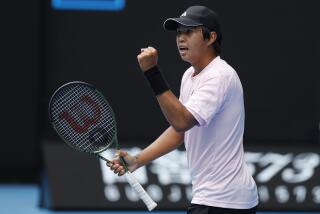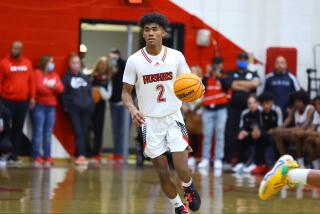Hansen-Dent Is Getting a Different Kind of Education : Tennis: After one year on pro tour, former Newport Harbor and UC Irvine player hasn’t fulfilled goals.
Brett Hansen-Dent, who left UC Irvine last year after two seasons of college tennis to join the professional tour, apparently hasn’t been tuning in to “The Daily Affirmation with Stuart Smalley” on Saturday Night Live.
Smalley’s motto, “I’m good enough, I’m smart enough and, gosh darn it, people like me,” is similar to what Hansen-Dent’s father and his college coach have been trying to ingrain into his head for years now.
“He’s got the talent,” said Phil Dent, Brett’s father and a former top-10 doubles player. “It’s just getting through the other stuff that’s the hard part for him. He needs to get past the part of knowing that he’s good enough.”
Greg Patton, who coached Brett at UCI for two years and is now at Boise State, said a lack of self-confidence was always Hansen-Dent’s biggest shortcoming.
“I always told Brett that he didn’t know how good he was,” Patton said. “He blossomed a little late because he didn’t know how good he was.
“There’s a lot of great working cars, but it’s all about who has the engine. You have to have the right key to turn it on.”
Hansen-Dent, ranked No. 504 in singles and 330 in doubles on the Assn. of Tennis Professionals computer after nearly a year of playing satellite tournaments, said he’s closer to finding the right key than he was six months ago, but acknowledged that he’s still searching for it.
“I’m just waiting for that one match right now,” Hansen-Dent said by telephone from Germany this week.
One match, a 6-0, 6-3 loss in January to former Stanford star Alex O’Brien in a Palm Springs qualifying tournament, nearly prompted Hansen-Dent to quit the tour and return to college tennis.
“It was a terrible loss,” he said. “I wasn’t into the match and he didn’t let me get into it either. I said to myself, ‘What am I doing? I don’t know if I want to do this. Maybe I should go back to school.’ ”
USC tennis Coach Dick Leach, whose son Jonathon played against Brett in junior tennis, wondered the same thing and offered Brett a scholarship.
“I told him that I’d think about it,” said Hansen-Dent, who recently turned 21. “If I don’t start winning, I said I might take him up on his offer.”
If it wasn’t for his father, Hansen-Dent might be entering USC this fall.
“My dad said, “Just give it a year and if you still don’t like it, then we’ll talk about (college),” Hansen-Dent said.
Phil Dent pushed his son toward the professional tour, even though he knows it’s a lot more grueling than it was in his day.
“There’s a lot more guys now,” Dent said. “In my time, if you had a good reputation, you got in the big tournaments. There’s a lot of money out there.
“I don’t think he knew it would be this hard. But if you go through all the steps to get there, you appreciate it more when you get there.”
Phil Dent said he still gives his son weekly advice from wherever the satellite and challenger tour takes Brett. Lately, it has taken him to Malaysia, Puerto Rico, Jamaica, and now the clay-court circuit in Germany for five weeks.
“We talk about a lot of things, but mostly I tell him to forget about who you are playing and to believe in yourself,” Phil Dent said.
Brett said he is finally getting the message.
“I just realized about a week ago that I’m good enough to beat a lot of these guys,” Brett said. “I watch a lot of matches and I see guys play that I know I’m better than. But their ranking is a lot higher than mine.
“I finally said, ‘This is ridiculous.’ I understand that out here, everybody can hit the ball. Knowing you can do it and doing it on the big points is the hard part.”
Hansen-Dent said he also lacked confidence in his junior tennis days.
“I was good in the juniors,” Hansen-Dent said. “When I played guys ranked higher than me, I’d give them a good match. But I’d always lose. But then one day, I beat Jon Leach and that got me over the hump.”
Hansen-Dent went from the juniors and Newport Harbor High to UCI, where he played No. 1 singles as a freshman and went 30-13, qualifying for the NCAA individual tournament. As a sophomore, Hansen-Dent went only 16-14 at No. 1 singles but he won the Big West singles and doubles title and was named Big West player of the year.
By the end of his sophomore year, Hansen-Dent felt he had proved enough at the collegiate level, even though he was only 37th in the final Intercollegiate Tennis Assn. singles rankings.
“I watched a lot of matches on television and I just knew I wanted to be out there,” he said.
But Hansen-Dent said there were other factors involved in his decision to leave school two years early.
“I was only psyched up to go to one class and that was Spanish because I loved learning a foreign language,” he said. “But that’s not why I left.”
He said another reason was the departure of Patton and the instability of the men’s team.
“The team was going downhill a little,” he said. “Brett Stern was leaving (for the University of Florida) and (Charles Wheeler) was not good for the team. It just wasn’t that fun. I wanted out of there.”
Patton said he wasn’t surprised to hear Hansen-Dent was leaving UCI early.
“Two years at Irvine was good for him,” Patton said. “I think he realizes he needed those two years. Once I left I knew his commitment wasn’t binding.”
Hansen-Dent’s commitment to the pro tour isn’t necessarily binding, either. Because he has not won more than $250 beyond expenses in any tournament, Hansen-Dent is still eligible to play college tennis.
But Hansen-Dent doesn’t exactly sound like a person ready to return to campus and begin cramming for tests.
“I was getting homesick six months ago,” he said. “I didn’t want it as much. I know I want to do this now.”
And Hansen-Dent said he’s probably learning more on his world tour than he would have ever picked up in a classroom. His favorite stop?
“Easily, Kingston, Jamaica,” he said. “That place is crazy. I was the only one with long blond hair. Walking down the street, people are offering me marijuana and everything else. I wound up buying some reggae tapes from some (homeless) guy. I listened to the tape and it was horrible. You couldn’t even hear anything. Oh well, at least I helped the guy out.”
But even more, Dent said he’d like to help himself out with a couple of victories over players who are ranked higher.
“All you need is one good week and you’ll be in the top 250,” he said. “I wanted to be in the top 250 after a year and I can still get there. If I don’t get there, I’ll just reset my goals.”
Patton doesn’t doubt that Hansen-Dent will one day reach his goals.
“The guy’s an artist,” Patton said. “He’s beautiful to watch. He’s got a gentle side to him when he plays. Nothing’s ever rushed or frantic. There’s a calmness to his game.”
But Hansen-Dent has quickly learned that calmness doesn’t always work on clay.
“A friend of mine told me, ‘When you get off the court, you want to feel like you’ve worked hard,’ ” he said. “I think I was always trying to look too smooth. But that doesn’t work here. You have to be able scratch and claw and get down in the dirt. Now, I’m trying to be more aggressive. And I’m hitting the ball a lot harder.”
Hansen-Dent added that mostly he’s hitting the ball in virtual obscurity. He said no one cares how hard he’s hitting it, except his father and maybe a couple friends.
“It can be kind of lonely out here,” he said. “I do miss playing for a team, having all the guys cheering for you.
“Now, I’m on one of the back courts and it’s me, my opponent and an umpire. Hopefully, someday I’ll be playing in a big stadium before a big cheering crowd.”
By then, Hansen-Dent won’t need Stuart Smalley, or his dad, to tell him how good he is.
More to Read
Go beyond the scoreboard
Get the latest on L.A.'s teams in the daily Sports Report newsletter.
You may occasionally receive promotional content from the Los Angeles Times.










